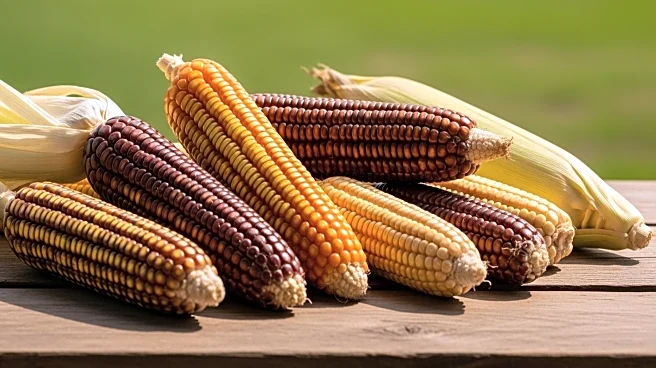What is the story about?
What's Happening?
CIMMYT is addressing food security challenges exacerbated by climate change by developing maize varieties that can withstand heat, drought, diseases, and pests. These varieties are not genetically modified but are created through conventional breeding methods using public germplasm and advanced trait selection tools. The demand for these stress-tolerant maize varieties is increasing, with 85 organizations applying for licenses to register and commercialize CIMMYT's maize hybrids and open-pollinated varieties in the first half of 2025, marking a 17% increase from the previous year. This surge in interest reflects growing trust in CIMMYT's breeding program and its ability to deliver resilient crops.
Why It's Important?
The development and distribution of stress-tolerant maize varieties are crucial for enhancing food security, particularly in regions like sub-Saharan Africa where maize is a staple crop. These varieties help stabilize yields and reduce risks for farmers facing erratic weather patterns, emerging pests, and poor soil conditions. The economic impact is significant, with CIMMYT-derived maize varieties generating billions in economic benefits annually across developing countries. This initiative supports smallholder farmers, promotes sustainable agricultural practices, and contributes to climate resilience, making it a vital component of global food security strategies.
What's Next?
CIMMYT plans to continue facilitating the licensing and commercialization of its maize varieties, prioritizing public-sector applicants and engaging with private firms to ensure widespread access to high-quality seeds. The organization aims to support private companies in entering the maize seed business by providing licenses for their varieties, encouraging uptake and commercialization. As demand for improved germplasm grows, CIMMYT will need increased funding and support from international partners to sustain its breeding programs and meet the rising demand for resilient crops.
Beyond the Headlines
The broader implications of CIMMYT's work include fostering public-private partnerships that drive agricultural innovation and impact. By collaborating with seed companies and national systems, CIMMYT ensures that improved seed varieties reach the farmers who need them most, enhancing their ability to thrive despite climate uncertainties. This model of collaboration and investment in public breeding programs highlights the importance of strategic partnerships in achieving sustainable agricultural development and food security.
















